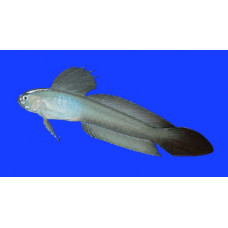Latin name
Oxymetopon typus
Other name
Oxymetopon typus
Identification
Oxymetopon: Greek, oxys = sharp + Greek, metopon = brow.
Sailfin gobies have a large, broad head, large, close-set eyes, and a suction cup on the underside that is formed by the fusion of the pelvic fins. They use this sucker to attach themselves to the bottom rocks and are held quite firmly even in a strong storm.
Features of fish fins
Dorsal spines (total): 6 - 7; Dorsal soft rays (total): 31; Anal spines: 1; Anal soft rays: 31.
Fish colouring
The body of the Sailfin Ribbon Goby is gray-blue in color.
Distribution
This species is widespread throughout the western central Pacific.
Habitat
Tropical marine, reef associated species. Habitat depth range 15-40 m.
Size
Males of this species reach a maximum length of 18.0 cm.
Behavior
Occupies deep muddy slopes with strong currents. Usually found in small groups, often varying in size.
Food and feeding habits
Sailfin gobies are predators that feed on invertebrates, zoobenthos, and zooplankton.
Reproduction
They attach their eggs to substrate such as vegetation, coral or rock surfaces. After fertilization, the male guards the eggs from predators and keeps the eggs free of detritus. The male fans the eggs to provide them with oxygen. The female maintains the burrow. The eggs hatch within a few days. The larvae are born transparent and acquire coloration as they disperse in search of a suitable habitat.
Fishing
This species is not commercially important.
Relationship with a person
Harmless.
| Classification | |
| Phylum | Chordata |
| Class | Actinopterygii |
| Squad | Gobiiformes |
| Family | Gobiidae |
| Genus | Oxymetopon |
| Species | O. typus |
| Features | |
| Conservation status | Not Evaluated |
| Habitat | Bottom |
| Life span, years | No information |
| Maximum body weight, kg | No information |
| Maximum length, cm | 18 |
| Sailing speed, m/s | No information |
| Threat to people | Edible |
| Way of eating | Predator |
Sailfin ribbon-goby
Tags: sailfin ribbon-goby

